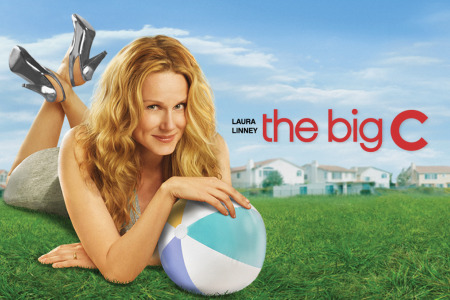Showtime: Television for Women, for Everyone?

Showtime
When Laura Linney's character Cathy is diagnosed with terminal cancer in the pilot of Showtime's new series The Big C, she puts her foot down. "I want onions to be a major part of my life in the next year," she tells her husband, for whom she swore off the vegetables because he thought they were "stinky poopoo."
Cathy—a teacher—is concealing her disease from her family and friends, channeling all its encompassing emotions in various seize-the-day episodes of acting out: spontaneously digging a whole in her backyard for a pool she's always wanted, setting her ugly couch on fire, and telling an overweight, troublemaking student that she can only be either "fat and jolly or a skinny bitch." The half hour, which premieres tonight (you can watch here now), is at once warmly relatable and darkly humorous; a series of deadpanned one-liners, sight gags, and quirky characters orbiting around a woman who is silently dealing with the reality of terminal illness.
It's a formula that Showtime knows very well. When the trailer for The Big C premiered Gawker ran an article with a headline reading, "Showtime Cornering the Market on 'Ladies With Problems' Shows." It's a pretty inarguable statement about the network that airs Weeds, Nurse Jackie, United States of Tara, and The Secret Diary of a Call Girl (Mary-Louise Parker as a pot-dealing mom, Edie Falco as a prescription-addicted nurse, Toni Collette as a mother with multiple personalities, and Billie Piper as an escort, respectively). The Big C makes the fifth Showtime series cooked from largely the same recipe—a comedy/drama hybrid, written and run largely by women, revolving around a sarcastic, worn-down-by-life matriarch. Then, as Gawker points out, there's the "problem": a pill habit, drug dealing, Dissociative Identity Disorder, or in this case, cancer. Even Showtime's chief executive Matthew Blank acknowledges the network's reputation, calling Linney's role another "classic Showtime character."
While it's easy to joke about Showtime's cookie-cutter mold, it's an undeniably successful formula for them. It's paid off with Emmy nominations for each of its leading ladies (and a win for Collette), plus a surprise Best Comedy Series nod for Nurse Jackie this year. In fact, all numbers confirm that Showtime's programming strategy is working. The network reached 22 million subscribers in 2009, and racked up more awards than other station.
But perhaps the most interesting thing about this particular pocket of Showtime's programming (the network's entire slate includes shows like Dexter and Californication, about men with problems—hardly news), is not that the respective series have been successful, but that they've been so diversely successful. Unlike other comedies that are focused on a singular female lead—Cougar Town, Drop Dead Diva, the late Ugly Betty and Samantha Who?—these Showtime series have avoided a "for women only" branding that alienates broad demographics of viewers, regardless of a show's quality. A comedy about women that men watch is a rare thing.

Showtime
The success of Weeds is largely due to its fanbase of young men (frat boys like a show about pot...shocking). That Nurse Jackie scored a major Emmy nod means that stuffy old suits at the Television Academy are actually watching it. And these guys are tuning in, uncharacteristically, despite the fact that Showtime is currently providing the most realistic, empowering portrayals of women in television.
Andrea Press, author of Women Watching Television and chair of media studies and professor of sociology at the University of Virginia, says that Showtime is picking up on representations of women that are virtually invisible in popular media. Edie Falco in Nurse Jackie is playing a character that's too old to find in film or on network television: "She's very smart and very much in control of everything—the workplace, the family—even though she has the drug habit." With Weeds, Mary-Louise Parker's character exhibits, albeit through a slightly warped sense of reality, some typically overlooked aspects of a single mother's life. Divorce or a spouse's death, for example, can catapult a woman into poverty; on Weeds, this leads to drug dealing. "This stressful life is the same life that most working mothers lead, and I don't think media captures how stressful things are," Press says. "Their plight is very much embedded in our social network."
And while the shows depict these relatable issues—Falco's Jackie, for example, struggles to find the time to take her daughter to a tap dancing class—Showtime does not market them as family dramas, or even as comedies about dysfunctional families. What the network has so deftly done is brand these shows around sexy, hot-button issues that draw in buzz and viewers—things like pill-popping nurses, a suburban moms dealing pot, multiple personalities, refusing cancer treatments—and capitalize on that initial intrigue to create fully realized female characters. Contemporary women's issues are examined in front of a wider audience than series (at least comedy series) based around those dynamics would ordinarily reach.
On Nurse Jackie, her drug addiction is just one level of the narrative, a companion to family and workplace drama. It's a balance, Press says, that broadens the appeal of Showtime's programming, demographically. "If you compare them to a typical television narrative watched by a woman, like Sex and the City, the issues go beyond what are labeled female issues—boyfriends, weight, hair color, and those things that we label as women's cultural issues."
So women are tuning in to see and relate to a comedy about a mother and a wife battling cancer, or a drug addiction, or any of Showtime's other patented "problems." Their husbands, sons, and friends—intrigued by the idea of a mom-turned-pot dealer—tune in for the drugs aspect, and then stick around because the issues are being depicted in such innovative and creative ways. "It's drug addiction, but not from the view of The Wire or the inner city life of a hit man," Press says. "We're looking at a respectable nurse, a housewife—it just broadens the fascination."
There are certain programming luxuries that Showtime has as a subscription channel with no commercials. It doesn't have to worry about specifically targeting certain demographics—like women—for the sole purpose of selling ads (which is a business model that Lifetime benefits from with its "Television for Women" branding). Showtime can disguise a show about a dysfunctional family behind the allure of Mary-Louise Parker smoking a joint. ABC, on the other hand, faces an uphill battle making a show titled Cougar Town, which is really about a dysfunctional group of friends, acceptable dude viewing.
But there's a case to be made that Showtime's success should change antiquated ideas about what female-centered programming should be like, for network and cable alike. Pot, pills, and psychiatrists be damned, Showtime, before anything else, has stayed away from feminine clichés—no nail salons or cosmos to be seen. Maybe that's where their success begins.
The series premiere of The Big C is tonight on Showtime at 10:30, right after the season premiere of Weeds.